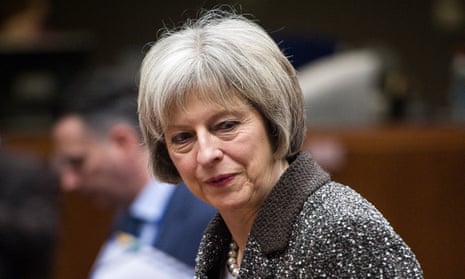A new £1,000-a-year immigration skills levy is expected to be introduced on all firms for each skilled migrant they recruit from outside Europe, under a new crackdown ordered by the home secretary, Theresa May.
The skills levy first suggested by David Cameron is part of a package recommended by the government’s migration advisory committee (MAC) that could see the flow of skilled non-EU migrants cut by 20% a year and could hit the recruitment of overseas nurses and teachers the hardest.
The government’s labour market experts say most skilled migrants from outside Europe bring scarce new skills to Britain and are higher paid than their British counterparts, but that there are some jobs – especially in the public sector, such as doctors, nurses and teachers – where they undercut UK salaries by up to £6,000 a year.
They recommend that the squeeze on the recruitment of skilled labour from outside Europe, currently running at 151,000 people a year, should include a sharp rise in the minimum salary threshold for jobs filled from overseas from £20,800 to £30,000.
The package also includes restrictions on what is known as “intra-company transfers”, which would limit their use to senior managers and specialists by raising the minimum salary for visas to £41,500.
May has ordered the crackdown on skilled labour from outside Europe in the face of record net migration figures of 336,000 to Britain in the 12 months to June last year.
She and Cameron asked the MAC to find ways of significantly reducing the current flow of skilled non-EU migrants a year into Britain.
She is expected to endorse the recommendations but has not yet made a final decision. A Home Office spokesman said: “We are grateful to the migration advisory committee for its report. We are considering its findings and will respond in due course.”
The committee said that the package could lead to a cut in skilled migration by 27,600 or 20% of the current flow of skilled migrants from outside Europe each year.
The recruitment of NHS nurses and teachers is expected to be most affected by the recommended changes, along with tech specialists working in software companies.
The increase in the minimum salary threshold to £30,000 would particularly affect nurses on what is known as “tier two” routes under the points-based immigration system. The committee recommends phasing in the changes for nurses and teachers.
The MAC report says the introduction of an immigration skills charge of £1,000 a head on skilled recruitment from outside Europe could raise £250m a year for skills funding, including apprenticeships. The charge would apply for each year a migrant works in Britain, so a three-year skilled migrant visa would carry a £3,000 charge. The final amount will be set by the chancellor.
The report says that skilled migrants are generally paid more than their British counterparts, but the analysis also found that in “some occupations – primarily in the public sector – migrants are often paid significantly less than similar UK workers, sometimes due to financial pressures”.
It found that overseas doctors and nurses were paid £6,000 a year less than British medical staff, and overseas secondary school teachers £2,000 a year less.
Prof David Metcalf, the MAC chairman, said: “Skilled migrant workers make important contributions to boosting productivity and public finances, but this should be balanced against their potential impact of the welfare on existing UK residents.
“Raising the cost of employing skilled migrants via higher pay thresholds and the introduction of an immigration skills charge should lead to a greater investment in UK employees and reduce the use of migrant labour.”
Part of the flow of skilled migrants under tier two has been capped at 20,700, which has increasingly been breached in recent months. The NHS’s recruitment of nurses in particular has been exempted from the cap. The MAC is to report next month on whether that temporary exemption should continue.

Comments (…)
Sign in or create your Guardian account to join the discussion